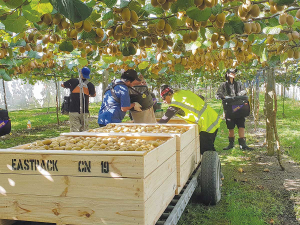Record Kiwifruit Crop 2025-26: Zespri Forecasts Highest Grower Returns
Good news for kiwifruit growers - a record crop with forecast per hectare returns at record levels for all fruit categories for the 2025-26 season.
 The aim of the new Kiwifruit Breeding Centre (KBC) JV is to bring the best kiwifruit cultivars to the market faster.
The aim of the new Kiwifruit Breeding Centre (KBC) JV is to bring the best kiwifruit cultivars to the market faster.
Zespri and Plant and Food Research are discussing forming a 50/50 joint venture to fast track the development of breeding new cultivars of kiwifruit.
A proposal is before the boards of both organisations to form a stand-alone Kiwifruit Breeding Centre (KBC). The aim is to build on the present successful plant breeding partnership between the two entities, but bring the best kiwifruit cultivars to the market faster.
The KBC would have its own board comprising representatives of both Zespri and Plant and Food, plus some independent directors. It would have its own CEO and up to about 50 staff – drawn from the two organisations. The plan is in the process of being approved by the respective boards with staff being consulted on the process.
If approved, the new joint venture would see the annual investment in kiwifruit plant breeding almost doubled to $50 million per annum.
Zespri’s innovation and sustainability manager Carol Ward told Rural News the present relationship between the two organisations has worked well with the commercialisation of G3 SunGold and red kiwifruit.
“Now we want to go harder and faster,” she says. “With this proposed joint venture we are looking at bringing the best of global kiwifruit breeding science together with Zespri’s marketing expertise to be able to bring new varieties to market faster.”
Ward says the plant breeding programme will be led by the extensive consumer and market research and intelligence gathered by Zespri. She says it is building a deep understanding of consumers in Europe, Asia and North America.
Ward adds that consumers have given a clear message that a healthy food product is critical to their needs. She says they are looking at when people eat kiwifruit – which often varies between markets. For example, in some cultures people tend to eat kiwifruit at breakfast time.
“One of the significant opportunities we see is to be able to provide kiwi berry variety – a small berry with edible skin that you can pop in your mouth – as more convenient to snack on and tastes delicious.”
Ward says they know that parents are conscious about giving their children healthy products, while at the same time elderly folk want to age in a healthy way and kiwifruit is the ideal food for them.
High on the agenda now for consumers is the sustainability of the product and Ward says that aligns with Zespri’s own values.
“What we know is that consumers who are interested in a healthy diet with good fruit are also really concerned about issues such as pollution, water quality, climate change, global warming, deforestation and biodiversity,” she adds.
“We are now working actively with retailers to assure consumers that we are looking after our staff within the industry and have quality environmental policies. We are also working to remove non-recyclable plastics from our packaging.”
While Zespri’s market intel will help drive the outcome of the breeding programme of the new joint venture, it will also be a strongly science-based programme. The headquarters for KBC will be in Te Puke, but research will be carried out in Motueka in the South Island and also at Plant and Foods facility in Auckland and at Kerikeri in Northland.
Ward says trials will also continue in Italy to make sure any new cultivars can grow in Italian environmental conditions. She says this is in-line with Zespri’s strategic objective to have a 12-month supply operation
Overseas Trade Minister Todd McClay says he's working constructively with the Labour Party in the hope they will endorse the free trade agreement (FTA) with India when the agreement comes before Parliament for ratification.
Donald Trump's latest tariff tantrum has again thrown the world of trade into a new round of turmoil and uncertainty, and NZ is caught up in it.
The third edition of the NZ Dairy Expo, held in mid-February in Matamata, has shown that the KISS principle (keep it simple stupid) was getting a positive response from exhibitors and visitors alike.
Twenty years ago, South African dairy farm manager Louis Vandenberg was sent to a farm in Waikato to provide training on Afimilk technology.
Strong farmgate milk price is helping boost investment on farms, says PGG Wrightson chief executive Stephen Guerin.
Fonterra's 460 milk suppliers in Australia, who will switch to Lactalis end of this month, are unfazed with the impending change.

OPINION: A mate of yours truly reckons rural Manawatu families are the latest to suffer under what he calls the…
OPINION: If old Winston Peters thinks building trade relations with new nations, such as India, isn't a necessary investment in…